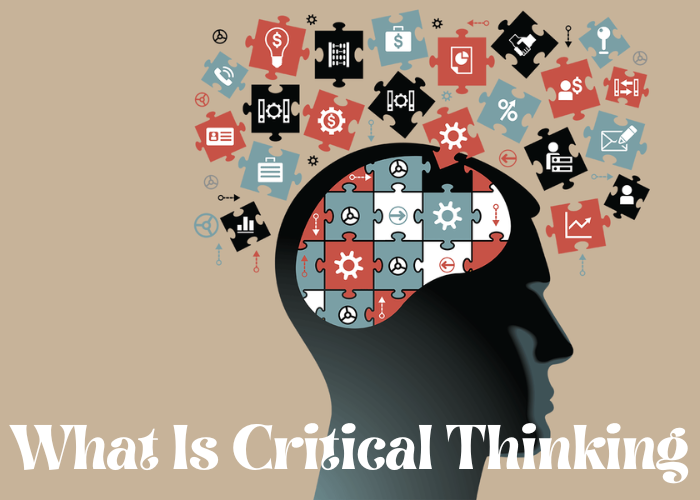
What is critical thinking? This is a question that many people have asked, and it is a difficult question to answer. The definition of critical thinking can vary depending on who you ask. Some people might say that critical thinking is simply being able to think clearly and logically. Others might say that it is being able to think critically about information and make informed decisions. Critical thinking involves using cognitive skills to analyze, interpret, and evaluate information. It is also important to be able to apply critical thinking skills when making decisions. Critical thinkers are able to objectively examine the information and assess its validity. They also consider the implications of their decisions before taking any action. If you want to improve your critical thinking skills, there are some things you can do: practice problem-solving, read critically, and participate in thought-provoking discussions. Critical thinking is a valuable skill that will help you in all aspects of your life.
What Is Critical Thinking, and Why Is It Important
Critical thinking is the ability to analyze information and come to your own conclusions. It’s an essential skill in nearly every field, from medicine to business to law.
There are several reasons why critical thinking is so important. First, it allows you to make better decisions. When you can analyze information and reach your own conclusions, you’re more likely to make choices that are in your best interest.
Second, critical thinking helps you solve problems more effectively. If you can identify the key issues and develop creative solutions, you’ll be better equipped to handle whatever challenges come your way.
Finally, critical thinking allows you to communicate more effectively. When you can explain your thoughts clearly and persuasively, you’ll be better able to get your point across – whether you’re writing an email or giving a presentation.
So why is critical thinking so important? There are three main reasons: it helps you make better decisions, solve problems more effectively, and communicate more effectively. Whether you’re at work or at home, these skills will come in handy – so start practicing your critical thinking today!
The Different Types of Critical Thinking
There are different types of critical thinking, and each one is important in its own way. One type of critical thinking is analytical thinking, which involves breaking down a problem or situation into smaller parts in order to understand it better. Another type of critical thinking is creative thinking, which involves coming up with new ideas or solutions to problems. The third type of critical thinking is practical thinking, which involves applying theoretical knowledge to real-world situations. All of these types of critical thinking are important in different ways, and each one can help you to see the world in a different and more insightful way.
How to Improve Your Critical Thinking Skills
If you want to improve your critical thinking skills, there are a few things you can do. First, make sure that you’re really paying attention to the information you’re taking in. Consider what you’re being told or shown, and try to identify any underlying assumptions. Second, don’t be afraid to question everything. If something doesn’t make sense, ask for clarification. Third, think about alternative viewpoints. When you’re considering a problem or issue, try to think about it from different perspectives. This will help you to see the issue more clearly and come up with better solutions. Finally, don’t be afraid to change your mind. If you’re presented with new information or a different viewpoint, be willing to reconsider your position. By following these tips, you can improve your critical thinking skills and become a better thinker overall.
The Benefits of Critical Thinking
Critical thinking is a process of actively and skillfully applying, analyzing, synthesizing, and/or evaluating information gathered from observation, experience, reflection, reasoning, or communication as a guide to belief and action. In its simplest form, critical thinking is a way of taking charge of your own mind. The benefits of critical thinking include the ability to see things from multiple perspectives, identify different assumptions, test hypotheses against evidence, spot errors in reasoning, and think creatively. When you learn how to think critically, you develop a stronger foundation for making decisions in all areas of your life. You become better equipped to handle challenging situations and make sound choices that lead to positive outcomes. As you can see, the benefits of critical thinking are many and varied. By learning how to think critically, you can take charge of your own mind and make better decisions in all areas of your life.
The Limitations of Critical Thinking
Critical thinking is an important skill for anyone who wants to make sound decisions and arguments. However, it is important to understand the limitations of critical thinking in order to avoid making flawed decisions. One of the limitations of critical thinking is that it can be slow and deliberative. In some situations, a quick decision is needed, and there is no time for a prolonged period of reflection. Another limitation of critical thinking is that it relies on information that may be incomplete or inaccurate. In order to make sound decisions, it is necessary to have access to accurate and complete information. However, this is often not possible, making it difficult to trust the conclusions reached through critical thinking. Finally, another limitation of critical thinking is that it can lead to decision paralysis. When faced with too many options or too much information, it can be difficult to make a decision at all. For these reasons, it is important to understand the limitations of critical thinking in order to use it effectively.
Critical Thinking in the Real World
Critical thinking is not just something that happens in your head. It is also something that you do in the world. Critical thinking is a process of actively and skillfully conceptualizing, applying, analyzing, synthesizing, and/or evaluating information gathered from, or generated by, observation, experience, reflection, reasoning, or communication, as a guide to belief and action. In other words, it is a way of using your mind to figure out things for yourself. Critical thinking is not just something that you do in the classroom; it is also a way of life. It is a way of looking at the world and evaluating information in order to make better decisions. Critical thinking is not just something that you do when you are trying to solve a problem; it is also a way of living your life. As such, it is important to learn how to think critically in the real world. There are many ways to do this, but here are three key things to keep in mind:
First, critical thinking is not about getting the right answer; it is about figuring out what the right answer is. This means that you need to be able to take information from multiple sources and perspectives and make sense of it. You also need to be able to question assumptions and challenge conventional wisdom. Second, critical thinking is not about being Critical Thinking in the real World 7 right all the time; it is about being willing to change your mind if new evidence arises. This means that you need to be open-minded and willing to consider new ideas and perspectives. Finally, critical thinking is not about winning arguments; it is about finding the truth. This means that you need to be willing to have honest conversations with people who disagree with you. If you can keep these three things in mind, you will be well on your way to learning how to think critically in the real world.
Conclusion:
Critical thinking is important because it allows you to assess a situation and come up with a logical solution. It is a skill that can be applied in all aspects of your life, from personal relationships to work situations. If you want to improve your critical thinking skills, there are a few exercises you can try. First, try to identify the assumptions that people make when they are talking to you. Second, try to view each situation from multiple perspectives. Lastly, don’t be afraid to question everything and ask for clarification if needed. By doing these things, you will become better at critically analyzing information and making sound decisions. Do you have any other tips on how to improve critical thinking skills? Share them with us in the comments below!










